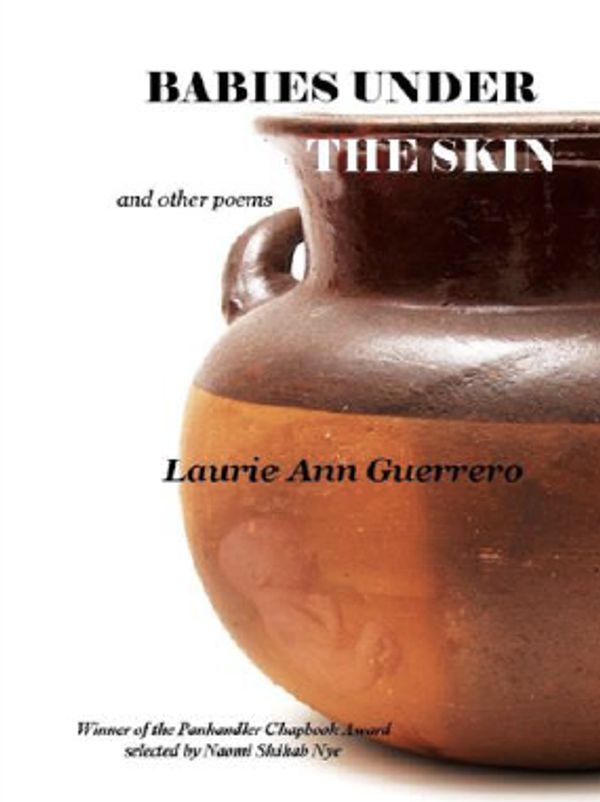
I HAVE EATEN THE RATTLESNAKE: NEW & SELECTED POEMS
TCU PRESS (2021)
THIS VOLUME IS THE FOURTEENTH IN THE TCU PRESS TEXAS POET LAUREATE SERIES.
This collection of Guerrero’s new and selected work documents the struggle to both honor and disrupt cultural, social, and familial traditions and histories. Hers is an honest and fearless examination of racism, sexism, domestic abuse, illness, and loss.
Feminist writer, mother, and educator, Guerrero has been described by the San Antonio Current as “a badass of poetic proportions.” In her poems, bodies sway “above the cotton like sheets on a line,” women turn into roosters, grief is carried like a newborn, snake venom is made in the marrow of the atlas bone, and the greatest revolution is “to sing graveside, to whisper intention into bowls of beans, to dance / without fear or fight.” With her unfailingly bold imagery and sharp eye, this collection of Guerrero’s work is a carefully constructed artifact by a poet who works and thinks with her hands.
__________
"Since tenderness is necessary but not sufficient in this world, Laurie Ann Guerrero has written her own manifestos, declarations of principle and poetics, telling us what it means to be an artist in a community under attack...She invokes ancestors, collective memories, hands that do what needs to be done...." -Martín Espada from the introduction
__________
"Fans of former Texas Poet Laureate, Laurie Ann Guerrero, will be delighted to find that I Have Eaten the Rattlesnake: New and Selected Poems has just the right mix of her patented, powerful imagery and messages that leave their mark." -Jose B. Gonzalez for Latino Stories, "Notable 2021 Latinx Books You Should Have Bought By Now"

A CROWN FOR GUMECINDO
AZTLAN LIBRE PRESS (2015)
*2016 HELEN C. SMITH POETRY AWARD FROM THE TEXAS INSTITUTE OF LETTERS
*NAMED ONE OF 14 "MUST READ WORKS" FROM SMALL PRESSES IN 2016 BY NBC LATINO
Dedicated and addressed to the poet’s grandfather, A Crown for Gumecindo is a heroic crown of sonnets that chronicles the grief experienced through the loss of the family’s patriarch. In 15 linked sonnets, journal entries, and meditations, Guerrero reexamines the lessons she inherited—both intentionally and unintentionally—through the careful dissecting of the multigenerational, multilingual, and multifaceted male-female relationship. Paintings by Maceo Montoya offer reader a layered experience of the tender and often shocking revelations of grief.
__________
“This crown of sonnets and the Maceo Montoya paintings that accompany them embody the complexity and depth of elegy. Wrought from both love and anguish, Guerrero, one of our finest lyric poets…invites us to the complex and dense universe of familial bonds.” —Carmen Giménez Smith, author of Be Recorder
__________
“Guerrero skillfully shapes the sonnet to build a crown of memory, tenderness, and grief for a man who becomes more than a man in this collection... Gumecindo, in these poems, becomes our beloved, our grandfather, the carpenter and king of our broken hearts.”
—Natalie Diaz, Pulitzer Prize Winning author of Postcolonial Love Poem
__________
“After the death of her beloved grandfather, Guerrero turns to the work and craft of poem-making and collaboration as methods of survival. The result is a tenaciously, keenly honed crown of sonnets that live in the territory of loss, resilience, and grief. In this book, the formal projects are profoundly linked to the heart of the content: interruptions, ruptures, and layers of texts seem to be as much about the anxiety of losing, loss, and, sometimes, of forgetting. A Crown for Gumecindo was worked for, and earned, and not without great resistance. The result of that work is staggering.”
—Aracelis Girmay, author of The Black Maria

A TONGUE IN THE MOUTH OF THE DYING
UNIVERSITY OF NOTRE DAME PRESS (2013)
*2012 ANDRES MONTOYA POETRY PRIZE
SELECTED BY FRANCISCO X. ALARCÓN
*2013 INTERNATIONAL LATINO BOOK AWARD FOR POETRY
Filled with the nuanced beauty and complexity of the everyday—a pot of beans, a goat carcass, embroidered linens, a grandfather’s cancer—A Tongue in the Mouth of the Dying journeys through the inherited fear of creation and destruction. The histories of South Texas and its people unfold in Laurie Ann Guerrero’s stirring language, including the dehumanization of men and its consequences on women and children. Guerrero’s tongue becomes a palpable border, occupying those liminal spaces that both unite and divide, inviting readers to consider that which is known and unknown: the body. Guerrero explores not just the right, but the ability to speak and fight for oneself, one's children, one's community—in poems that testify how, too often, we fail to see the power reflected in the mirror.
__________
"These poems restore my faith in the power of poetry." — Francisco X. Alarcón, judge
__________
“In poems crafted with tremendous skill, Laurie Ann Guerrero’s A Tongue in the Mouth of the Dying explores, so often, the ways in which the colonized or poor or brown have been brutalized, and their stories written by the conquerors. But the wonderful discovery one makes while reading what’s often painful and heart-breaking is that Guerrero’s the one telling us. In other words, the re-writing is begun. This is a powerful, necessary book."
— Ross Gay, author of Bringing the Shovel Down
__________
“Guerrero writes in a language of the body, visceral, almost unbearably vivid, the language of a poet who knows how to work with her hands. In an age when so many poems say nothing, these poems miss nothing ...attention must be paid to such a poet now and for years to come.”— Martín Espada, author of Vivas to Those Who Have Failed

BABIES UNDER THE SKIN
PANHANDLER PUBLISHING (2008)
2007 PANHANDLER CHAPBOOK AWARD
SELECTED BY NAOMI SHIHAB NYE
(out of print)
Join My Reader List
This website uses cookies.
We use cookies to analyze website traffic and optimize your website experience. By accepting our use of cookies, your data will be aggregated with all other user data.